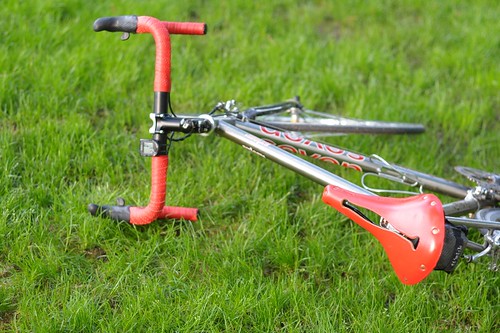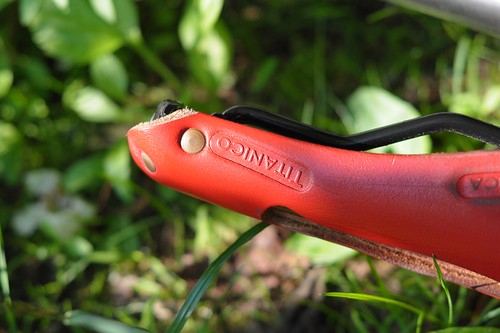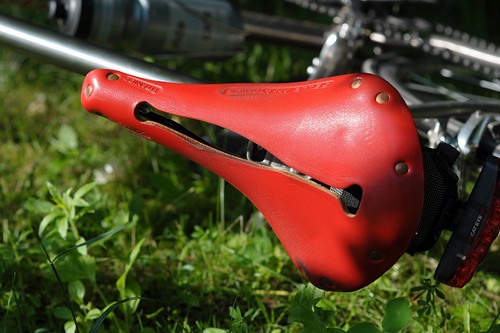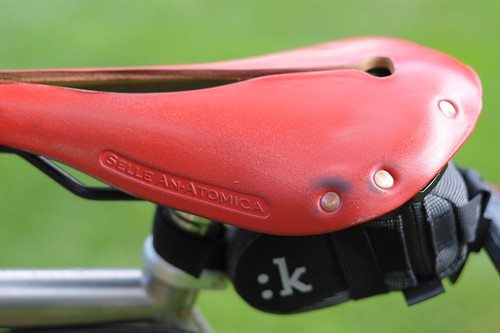[Edited to add: This review is of the older generation Selle Anatomica Titanico; the review of the current model can be found here.]
Some time ago I bought a red Selle Anatomica Titanico saddle, initially to go with a vintage bicycle I had at the time. But when I was loaned a Seven roadbike earlier this summer, the Selle Anatomica migrated onto it instead: It promised to be more comfortable than the bike's native racing saddle and was a perfect match for its red decals. This is how I had the saddle set up on the bike, and I put about 700 miles on it.
Founded in 2007 by the now deceased avid cyclist Tom Milton, Selle Anatomica is a small American manufacturer of leather saddles. The company is now run by the founder's sister, Meredith Milton Evans. Notably different from the other leather saddles on the market, Selle Anatomica offers several potentially attractive selling points. One is the long "anatomic" cut-out, which they claim allows the two sides of the saddle to move independently, thus relieving pressure on soft tissue. The other is the "watershed leather," which refers to the saddle's treatment with a waterproof top layer. The saddles are available in a variety of colours, and there are separate versions rated for heavier and lighter riders. You can read more about the design and specs here.
I purchased my saddle in Spring 2011 and since then a couple of changes have been made that I find somewhat confusing but will try to summarise. Selle Anatomica now advertises being made with cro-moly rails, so I am not sure what the rails on my saddle are made of. They also changed the weight criteria, so that what were formerly called the "Clydesdale" saddles and recommended for persons weighting over 180 lb have now become their regular saddles and are recommended for persons over 140 lb. If I understand these changes correctly, then what is now called the "Titanico" model is a slightly different product from the saddle I own, and the version I own is more comparable to what is now called the "Titanico Legacy." However, based on my conversations with the manufacturer I am not entirely certain of this, and I hope that she might clarify in the comments.
My impressions of the Selle Anatomica underwent several stages. Initially, the saddle felt so comfortable that I could hardly believe it. The tension of the leather was just right, there was no pressure anywhere, and the cut-out slot worked as advertised. The leather was softer, more pliable and more "hammock-like" than other leather saddles I'd tried and I could feel it moving with me, as opposed to my body moving against it. There was no chafing or soreness what so ever, and there was no breaking in period. It was almost too good to be true.
Then, after about 100 miles, I began to feel a sharp pinching pain in my "soft tissue." The pain would come and go, seemingly at random, and felt as if someone took a pair of pliers to a fold of skin along my crotch. Eventually I realised that the slot somehow began to close in at its narrowest part, pinching my skin right through the padded bicycle shorts. Soon after that I also noticed that (after only 150 miles), the saddle had sagged dramatically. At the time we were unable to determine whether it was the actual leather that sagged, or whether the bolt controlling the tension had unscrewed. But in retrospect it seems to have been the latter, because once we increased the tension and screwed the bolt in tightly, it did not sag again nearly as much.
We assumed that tensioning the saddle would also solve the pinching problem, but the occasional pinching persisted. We tried bending the leather inward in the part of the slot where it pinched, but that did not help. After some investigation, it turned out that a few others reported this same problem with Selle Anatomica saddles, and the recommended solution was to use a knife to enlarge the slot in the spot where it pinched. Just as we were debating whether to do this, the pinching suddenly stopped on its own around mile 400. I kept waiting for it to return, knife at the ready, but it did not. With no explanation, the saddle suddenly felt as good again as on the day I got it. For the remaining 300 miles I rode on the saddle, there has been a gradual and slight loss of tension, but no further problems.
Having ridden with this saddle in the rain multiple times on a bike with no fenders, I can confirm Selle Anatomica's claim that the saddle is absolutely waterproof. The rain just rolled right off without getting absorbed into the leather. However, the "watershed" layer eventually began to wear off - not from the rain, but from my contact with the saddle. You can see this in this picture, which was taken after 400 miles. On the manufacturer's website, it is suggested that the top layer could wear off over time as part of everyday use, and that eventually the owner may need to send the saddle back for re-waterproofing (which is done for an extra fee, as far as I understand). It is not specifed for how many miles the "watershed" leather is designed to last before the top layer needs to be reapplied.
Overall, my impression of Selle Anatomica is a positive, but somewhat frustrated one. If the tension remains as it should and the slot does not pinch, it is the most comfortable saddle I have ridden on. If the watershed layer remains intact, it is the most maintenance-free leather saddle I have experienced. However, neither of these factors has been stable for me, and so I would describe the saddle as high maintenance and rather unpredictable. With its price on par with mid-range Brooks and less than Berthoud, personally I would buy Selle Anatomica again and would be willing to fuss with it just to achieve the level of comfort I know it is capable of giving me. But be aware that this is an unusual saddle, and that user experiences tend to be varied - even more so than with the other leather saddle manufacturers. I hope that Selle Anatomica remains in business and continues to streamline its product. With its unique design, it is a welcome alternative to the other saddles currently on the market.











0 comments:
Post a Comment